一般现在时的用法及练习题
一般现在时用法及专项练习

一般现在时(the simple present tense)一、定义是一种英语语法形式,表示规律性、通常性、习惯性、真理性的动作或状态。
二、结构(一)肯定句1. 主语 + be 动词(am/is/are)+ 其他。
例如:I am a student.(我是一名学生。
)2. 主语 + 动词原形。
例如:We play basketball on weekends.(我们在周末打篮球。
)3.主语(第三人称单数)+动词第三人称单数形式。
一般在动词词尾加 -s 或 -es。
例如:He plays football after school.(他放学后踢足球。
)Tom usually goes to school at 7:30.(汤姆通常7点半去学校。
)(二)否定句1. 主语 + be 动词(am/is/are)not +其他。
例如:I am not a student.(我不是一名学生。
)2. 主语 + do not(don’t) +动词原形。
例如:We do not play basketball on weekends.(我们周末不打篮球。
)3.主语(第三人称单数)does not(doesn’t )+动词原形。
例如:He does not play football after school.(他放学后不踢足球。
)(三)一般疑问句1. Be动词+主语+其他?例如:Is she a student?(她是学生吗?)2. Do/Does + 主语 + 动词原形?例如:Do you play football after school? (你放学后踢足球吗?)Does he work here? (他在这里工作吗?)三、用法1. 描述习惯或重复动作:常与表示频率的时间状语连用。
例如:I get up at 6 o'clock every morning. (我每天早上六点起床。
)He goes to school by bus. (他乘公共汽车上学。
小学英语语法一般现在时用法专项练习

小学英语语法一般现在时用法专项练习一、规律性的动作时间标志词:every day(每天) always(总是) often(经常) usually(通常)on Fridays(每周五) once a week(一周一次)I get up at six o’clock every day. 我每天6点起床。
二、现在的状态be动词I am happy.我很高兴。
You are beautiful. 你很漂亮。
He is tall. 他很高。
我用am 你用are is 连着他她它三、真理“三单”判断标准:不是我,不是你,并且只有一个。
“三单”的动词变化规则:一般加s,二般(动词以s,x,sh,ch,o结尾)加es,三般辅Y结尾,把y改i加es,四特have-has(有)。
四、肯定句-否定句:1.be动词后加not2.行为动词(实意动词)前加don‘t,“三单”加doesn’t。
五、肯定句-一般疑问句:1.be动词提前到句首,首字母大写,句尾改问号。
2.行为动词(实意动词)句首加助动词,“三单”加does,其他加do,首字母大写,句尾改问号。
助动词用法宝典:助动一出现,动词变原型。
一、写出下列动词的第三人称单数。
drink ________ go _______ stay ________ make ________look _________ have_______ pass_______ carry ____come________ watch______ plant_______ fly ________study_______ brush________ do_________ teach_______二、用括号内动词的适当形式填空。
1. He often ________(have) dinner at home.2. Daniel and Tommy _______(be) in Class One.3. We _______(not watch) TV on Monday.4. Nick _______(not go) to the zoo on Sunday.5. ______ they ________(like) the World Cup?6. What _______they often _______(do) on Saturdays?7. _______ your parents _______(read) newspapers every day?8. The girl _______(teach) us English on Sundays.9. She and I ________(take) a walk together every evening.10. There ________(be) some water in the bottle.11. Mike _______(like) cooking.12. They _______(have) the same hobby.13. My aunt _______(look) after her baby carefully.14. You always _______(do) your homework well.15. I _______(be) ill. I’m staying in bed.16. She _______(go) to school from Monday to Friday.17. Liu Tao _______(do) not like PE.18. The child often _______(watch) TV in the evening.19. Su Hai and Su Yang _______(have) eight lessons this term.20. -What day _______(be) it today?- It’s Saturday.三、按照要求改写句子。
英语一般现在时用法详解
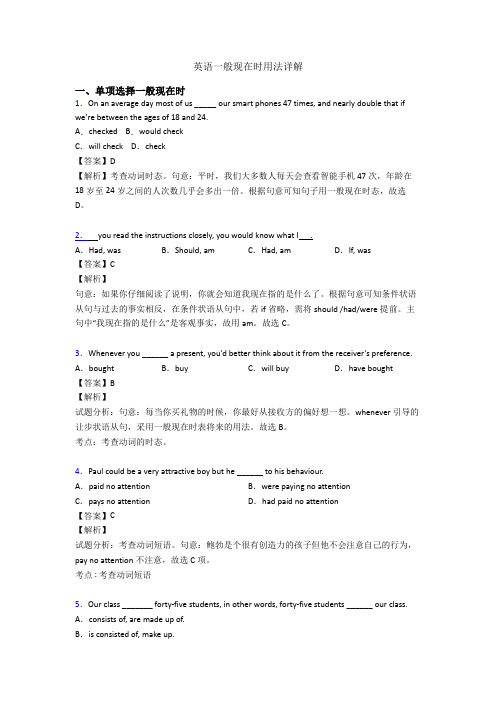
一、单项选择一般现在时
1.On an average day most of us _____ our smart phones 47 times, and nearly double that if we’re between the ages of 18 and 24.
A.checked B.would check
A.have told; washB.have been told; wash
C.was told; washedD.have been told; are washed
【答案】B
【解析】
考察时态。根据题意,我想买那种衣服,因为有人告诉过我他们洗起来不错。可知从句内容为过去已经完成的动作,故用过去完成时态。他们洗起来不错则是一个客观存在的事实,过去存在,现在及将来都会存在,故用一般现在时态。选B。
12.He’s been informed that he ________ for the scholarship because of his academic background.
A.hasn’t qualifiedB.hadn’t qualified
C.doesn’t qualifyD.wasn’t qualifying
—Would you like a piece of this kind of cloth?
—It sells well.它好卖。
考点:考查时态和语态
8.Every time he ______ to visit me, he ______ buy me some books.
A.will come; willB.will come; would
A.playedB.plays
动词八大时态用法以及练习总结精华
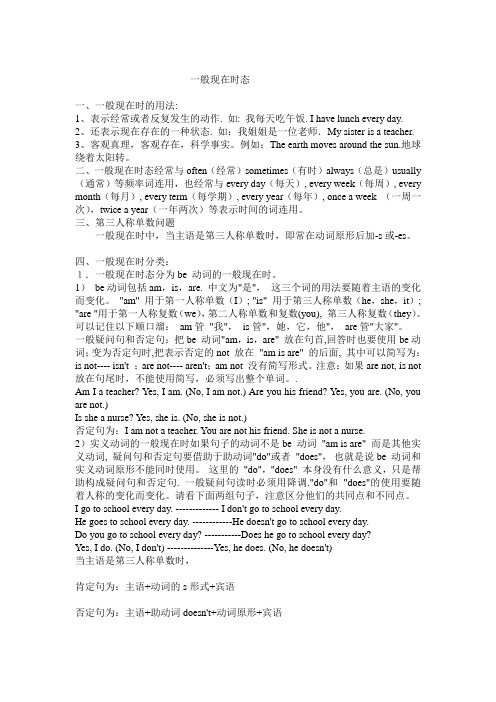
一般现在时态一、一般现在时的用法:1、表示经常或者反复发生的动作. 如: 我每天吃午饭. I have lunch every day.2、还表示现在存在的一种状态. 如:我姐姐是一位老师.My sister is a teacher.3、客观真理,客观存在,科学事实。
例如:The earth moves around the sun.地球绕着太阳转。
二、一般现在时态经常与often(经常)sometimes(有时)always(总是)usually (通常)等频率词连用,也经常与every day(每天), every week(每周), every month(每月), every term(每学期), every year(每年), once a week (一周一次),twice a year(一年两次)等表示时间的词连用。
三、第三人称单数问题一般现在时中,当主语是第三人称单数时,即常在动词原形后加-s或-es。
四、一般现在时分类:1.一般现在时态分为be 动词的一般现在时。
1)be动词包括am,is,are. 中文为"是",这三个词的用法要随着主语的变化而变化。
"am" 用于第一人称单数(I); "is" 用于第三人称单数(he,she,it); "are "用于第一人称复数(we),第二人称单数和复数(you), 第三人称复数(they)。
可以记住以下顺口溜:am管"我",is管",她,它,他",are管"大家"。
一般疑问句和否定句:把be 动词"am,is,are" 放在句首,回答时也要使用be动词;变为否定句时,把表示否定的not 放在"am is are" 的后面, 其中可以简写为:is not---- isn't ;are not---- aren't;am not 没有简写形式。
英语语法一般现在时,结构,用法全打尽!(附习题)
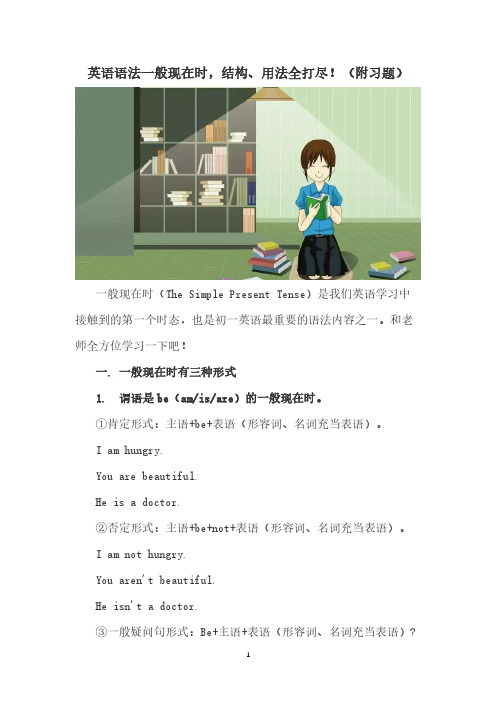
英语语法一般现在时,结构、用法全打尽!(附习题)一般现在时(The Simple Present Tense)是我们英语学习中接触到的第一个时态,也是初一英语最重要的语法内容之一。
和老师全方位学习一下吧!一. 一般现在时有三种形式1. 谓语是be(am/is/are)的一般现在时。
①肯定形式:主语+be+表语(形容词、名词充当表语)。
I am hungry.You are beautiful.He is a doctor.②否定形式:主语+be+not+表语(形容词、名词充当表语)。
I am not hungry.You aren't beautiful.He isn't a doctor.③一般疑问句形式:Be+主语+表语(形容词、名词充当表语)?肯定回答:Yes,主语+be. 否定回答:No, 主语+ be+not.—Are you hungry?—Yes,I am./No,I'm not.—Is he a doctor?—Yes, he is./No, he isn,t.④特殊疑问句形式:特殊疑问词+Be开头的一般疑问句?—What is he?—He is a doctor.注意:be要随着主语变。
2. 谓语动词是实义动词(及物动词或不及物动词)的一般现在时。
①肯定形式:“主语+及物动词+宾语”或“主语+不及物动词”。
She has a little brother.她有一个弟弟。
The sun rises in the east.太阳从东方升起。
②否定形式:“主语+don't/doesn't+及物动词+宾语”或“主语+don't/doesn't+不及物动词”。
She doesn't have a little brother.她没有弟弟。
I don't eat every morning.我每天早晨都不吃饭。
③一般疑问句形式:“Do/Does+主语+及物动词原形+宾语”或“Do/Does+主语+不及物动词原形”。
一般现在时的用法(1)

一般现在时的特点:一、表示现在的状态。
1、现在几点了?七点半。
2、我和大明及玲玲在一班。
3、足球赛在哪举行?在大连体育馆。
4、汤姆和迈克在哪?他们在图书馆。
5、什么时候上游泳课?下午上。
6、我母亲是北京国际学校的一名教师。
7、我们班紧挨着六班。
8、房子前面有两座高楼。
二、表示经常性或习惯性的动作。
1、我晚上七点二十做作业。
2、你早上6:30起床。
3、我们下午两点十五分上科学课。
4、他们星期天去游泳。
5、我们下午上四节课。
6、他们下午五点半回家。
7、你们在学校吃午餐吗?是的8、我们不喜欢化学。
我们喜欢历史。
9、学生们星期三下午不上化学课。
10、你早上六点半起床吗?不。
11、他们在哪吃晚饭?在家用所给动词的适当形式填空:1、Tom with his two brothers______(be) in the dinninghall now.2.Mary and her parents_____(be )at home.3.Where_____(be)the teacher? He _____(be )in the classroom.4.I _____(finish)my homework at half past eight in the evening.5.Lucy and her sister____(like)art very much.6.We_____(not go )to school onSundays.7.___you____(have)lunch at school?8.We usually finish___(do)our homework at school.9.What time ___your parents___(go)to work?四、就划线部分提问1.I get up at six o’clock in the morning.2.The children go to the park on Sunday.3.It’s five o’clock now.。
小升初英语动词一般现在时用法单选题40题
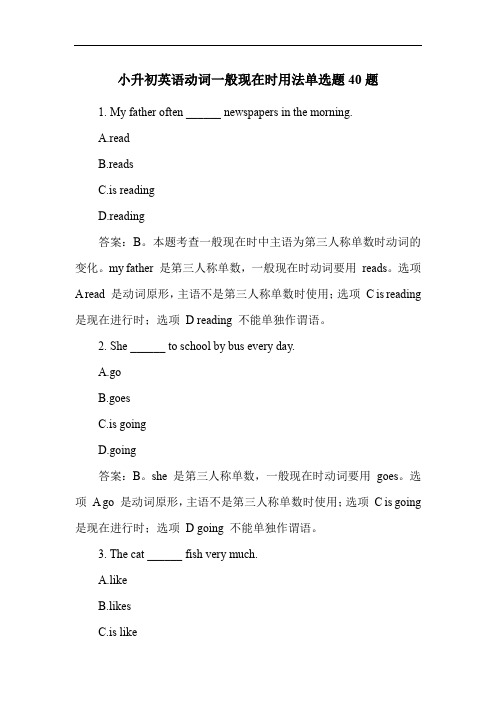
小升初英语动词一般现在时用法单选题40题1. My father often ______ newspapers in the morning.A.readB.readsC.is readingD.reading答案:B。
本题考查一般现在时中主语为第三人称单数时动词的变化。
my father 是第三人称单数,一般现在时动词要用reads。
选项A read 是动词原形,主语不是第三人称单数时使用;选项C is reading 是现在进行时;选项D reading 不能单独作谓语。
2. She ______ to school by bus every day.A.goB.goesC.is goingD.going答案:B。
she 是第三人称单数,一般现在时动词要用goes。
选项 A go 是动词原形,主语不是第三人称单数时使用;选项C is going 是现在进行时;选项D going 不能单独作谓语。
3. The cat ______ fish very much.A.likeB.likesC.is likeD.liking答案:B。
the cat 是第三人称单数,一般现在时动词要用likes。
选项 A like 是动词原形,主语不是第三人称单数时使用;选项C is like 表示“像……”;选项D liking 不能单独作谓语。
4. My sister ______ her homework after school.A.doB.doesC.is doingD.doing答案:B。
my sister 是第三人称单数,一般现在时动词要用does。
选项 A do 是动词原形,主语不是第三人称单数时使用;选项 C is doing 是现在进行时;选项D doing 不能单独作谓语。
5. He ______ football on weekends.A.playB.playsC.is playingD.playing答案:B。
小学生一般现在时讲解及练习题
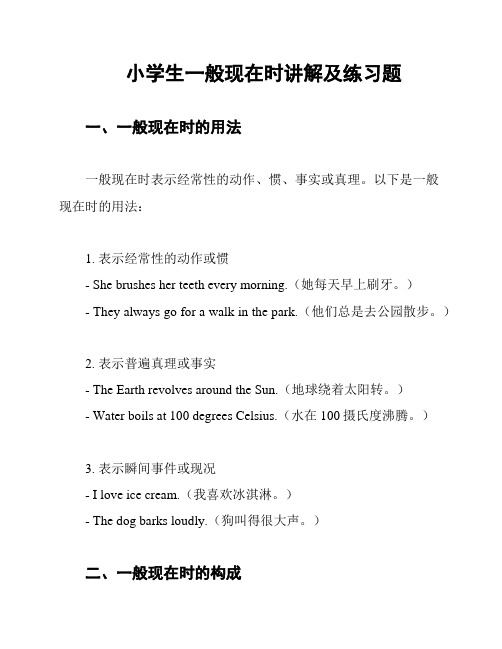
小学生一般现在时讲解及练习题一、一般现在时的用法一般现在时表示经常性的动作、惯、事实或真理。
以下是一般现在时的用法:1. 表示经常性的动作或惯- She brushes her teeth every morning.(她每天早上刷牙。
)- They always go for a walk in the park.(他们总是去公园散步。
)2. 表示普遍真理或事实- The Earth revolves around the Sun.(地球绕着太阳转。
)- Water boils at 100 degrees Celsius.(水在100摄氏度沸腾。
)3. 表示瞬间事件或现况- I love ice cream.(我喜欢冰淇淋。
)- The dog barks loudly.(狗叫得很大声。
)二、一般现在时的构成在一般现在时中,动词的变化相对简单。
1. 对于第三人称单数(He/She/It),动词要加-s或-es。
- He walks to school every day.(他每天走路去学校。
)- She eats an apple.(她吃一个苹果。
)- It runs fast.(它跑得很快。
)2. 对于其他人称(I/You/We/They),动词不变。
- I play soccer on weekends.(我周末踢足球。
)- You read books every night.(你每晚读书。
)- We go swimming in summer.(我们夏天去游泳。
)- They watch movies together.(他们一起看电影。
)三、练题请根据句意填入正确的动词形式。
1. My mother __________ (cook) dinner for us every evening.2. Tom and Lisa __________ (play) tennis on Saturdays.3. The sun __________ (rise) in the east.4. We __________ (study) English at school.5. Dogs __________ (bark) when they see strangers.1. cooks2. play3. rises4. study5. bark希望以上讲解和练习题对你有帮助!。
- 1、下载文档前请自行甄别文档内容的完整性,平台不提供额外的编辑、内容补充、找答案等附加服务。
- 2、"仅部分预览"的文档,不可在线预览部分如存在完整性等问题,可反馈申请退款(可完整预览的文档不适用该条件!)。
- 3、如文档侵犯您的权益,请联系客服反馈,我们会尽快为您处理(人工客服工作时间:9:00-18:30)。
一般现在时的用法及练习题定义:一般现在时表示现在经常反复发生的动作、存在的状态或习惯性的动作的时态。
构成:一般现在时用行为动词的原形,但第三人称单数作主语时,动词的词尾要加-S。
(一般的动词词尾+S。
以sh/ch/s/x结尾的词+es.以辅音字母Y结尾的把Y 变成i,+es。
辅音字母+o结尾的+es.)形式:主语+动词原形+宾语用法:1.表示经常的或习惯性的动作,常与表示频度的时间状语连用。
2.表示主语具备的性格、能力和特征。
3.表示现在的状态。
4.表示客观事实和普遍真理。
5.在时间状语从句和条件状语从句中,常用一般现在时代替将来时。
6.表示预先计划或安排好的行为。
7.小说故事用一般现在时代替一般过去时。
8.有些表示状态和感觉的动词表示现在发生的具体行为时,只用一般现在时,而不用进行时态。
9.表示现在发生的具体动作或存在的状态一般现在时的用法:1) 经常性或习惯性的动作,常与表示频度的时间状语连用。
时间状语:always, usually, regularly, every morning/night/evening/day/week, often, sometimes, occasionally, from time to time, twice a week, rarely, seldom, once a month hardly ever, never.I leave home for school at 7 every morning.2) 客观真理,客观存在,科学事实。
The earth moves around the sun.Shanghai lies in the east of China.3) 表示格言或警句中。
Pride goes before a fall. 骄者必败。
☆注意★:此用法如果出现在宾语从句中,即使主句是过去时,从句谓语也要用一般现在时。
例:Columbus proved that the earth is round..4) 现在时刻的状态、能力、性格、个性。
I don't want so much.Ann Wang writes good English but does not speak well.比较:Now I put the sugar in the cup.I am doing my homework now.第一句用一般现在时,用于操作演示或指导说明的示范性动作,表示言行的瞬间动作。
再如:Now watch me, I switch on the current and stand back. 第二句中的now 是进行时的标志,表示正在进行的动作的客观状况,所以后句用一般现在时。
5).表示按规定、计划或时间表将要发生的事。
He starts next week.他下个星期出发。
We leave very soon.我们很快就离开。
The train starts at 10 o'clock in the morning.火车将在早上10点开出。
这类用法限于表示“移动”的动词:go去,come来,leave离开,start出发,begin 开始,arrive到达,take off起飞,等。
一般现在时Be动词情况am, is, are也可以做一般现在时的助动词例如: I am a student.一般现在时表将来:1)下列动词:come, go, arrive, leave, start, begin, return, live, fly的一般现在时表将来。
这主要用来表示在时间上已确定或安排好的事情。
The train leaves at six tomorrow morning.When does the bus start? It starts in ten minutes.2)倒装句,表示动作正在进行,如:Here comes the bus. = The bus is coming.There goes the bell. = The bell is ringing.3)在时间或条件句中。
When Bill comes (不是will come), ask him to wait for me.I'll write to you as soon as I arrive there.4)在动词hope, take care that, make sure that等后。
I hope they have a nice time next week.Make sure that the windows are closed before you leave the room.基本形式(以do为例):主动态:do被动态:be done过去时:did第三人称单数形式:does第三人称单数问题一般现在时中,当主语是第三人称单数时,即常在动词原形后加-s或-es。
第三人称单数变化,现归纳总结如下:1.人称代词he, she, it是第三人称单数。
如:He likes watching TV.他喜欢看电视。
She has lunch at twelve.她十二点吃午餐。
It looks like a cat.它看起来像只猫。
2.单个人名、地名或称呼作主语;用第三人称单数。
如:①Han Mei looks like her mother.韩梅看起来像她的母亲。
②Beijing is in China.北京在中国。
③Uncle Wang often makes cakes.王叔叔经常做蛋糕。
3.单数可数名词或"this / that / the/ a +单数可数名词"作主语时,是第三人称单数。
如:①A horse is a useful animal.马是有用的动物。
②This book is yours.这本书是你的。
③That car is red.那辆小汽车是红色的。
④The cat is Lucy's.这只猫是露茜的。
4.不定代词someone, somebody, nobody, everything, something等及指示代词this, that作主语时,第三人称单数。
①Everyone is here.大家到齐了。
②There is something wrong with the watch.这块手表有毛病。
③This is a pen.这是一支钢笔。
④That is an eraser.那是一块橡皮擦。
5.不可数名词作主语时为第三人称单数。
如:①The milk is in the glass.②The bread is very small.6.当数字或字母作主语时,看作第三人称单数。
如:①"6" is a lucky number."6"②"I" is a letter.发音规则动词原形变第三人称单数的规则与发音规律同名词单数变复数大致相同,请认真观察。
1、大多数动词在词尾加“S”在清辅音后发音为[s],在浊辅音及元音后发音为[z]。
如:①stop-stops [s] ; make-makes [s]②read-reads [z] ; play-plays [z]2、以辅音字母加“y”结尾的,要先将“y”变为“i”,然后在加“es”读[iz] 如:fly-flies [z];carry-carries [z]study-studies [z]; worry-worries3、以“s, x, ch, sh”结尾的,在词尾加“es”,发音为[iz] 如:teach-teaches [iz]; watch-watches [iz]4、以“o”结尾的动词,加“es”,读[z] 如:go-goes [z] do-does [z]注:下面几个动词变为单数时,原词的元音部分的发音发生了较大的变化,请注意记忆。
如:1、do [du:]-does [dz]2、say [sei]-says [sez]以不发音字母“e”结尾的开音节词,如果尾音是[s],[z]时,加“s”后字母“e”发音,与所加“s”一起读做[iz]。
如:close-closes [iz]作业I. 写出第三人称单数:wash_________ match _______guess______ study______ finish_________ go________ snow______ carry_________II. 用所给动词的适当形式填空:1. He________ TV every evening. (watch)2. We always ________ to school on foot. (go)3. Tom, with his classmates, often ______ football after school. (play)4. Your shoes _______ under the bed. (be)5. ______ here and ______ by me. (come, stand)6. His uncle usually _________ to work by bus. (go)7. I always ______ up at six in the morning.(get)8. John ________ like his father. (look)III. 完成句子根据所给中文意思,在空白处填入适当词语完成句子。
每空一词,请直接在答题纸上完成,不要在此页上作答。
1.该吃晚饭了。
I t’s time to ________ ________.2.你想来点儿面包吗?Would you ________ some ________ ?3.安娜太小,还不能上学。
Ann is ________ young ________ go to school.4.约翰跑得和我一样快。
John runs ________ fast ________ me.5.布莱克太太经常在英语上帮助我们。
Mrs. black often ________ us ________ our English .6.老师让我们每天说英语。
The teacher tells us ________ ________ English every day.7.为什么不让孩子们做他们喜欢的事情?________ ________ let the children do what they like?Key:二、1. watches 2. go 3. plays 4. are 5. come, stand6. goes7. get, got8. looks三、1. I t’s time to have supper.2. Would you like some bread?3. Ann is too young to go to school.4. John runs as fast as me.5. Mrs. black often helps us with our English.6. The teacher tells us to speak English every day.7. Why not let the children do what they like?。
